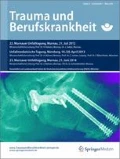Zusammenfassung
Das betriebliche Gesundheitsmanagement gewinnt zunehmend an Bedeutung. Um ein solches effizient zu etablieren, ist eine Evaluation sinnvoll. Das am IPASUM (Institut und Poliklinik für Arbeits-, Sozial- und Umweltmedizin) entwickelte Evaluationstool ermöglicht es, mit seinen verschiedenen Modulen neben einem aktuellen Status zudem handlungsrelevante Informationen zu liefern, d. h. sowohl Stärken als auch Schwächen zu identifizieren sowie konkrete Verbesserungsvorschläge des Befragten zu identifizieren, aufgrund derer man handeln kann. Am Beispiel eines Klinikums wird die sinnhafte Verwendung des vorgestellten Evaluationstools verdeutlicht.
Abstract
Occupational healthcare management is becoming increasingly important. Evaluation is advisable in order to establish effective healthcare management. Using its various modules, the evaluation tool developed at the German Institute for Occupational, Social and Environmental Medicine (IPASUM) makes it possible to obtain relevant information, in addition to current status, on both strengths and weaknesses, as well as recommendations for improvement. This information can form the basis for action. Using a particular hospital as an example, the present article illustrates the useful application of the evaluation tool in question.


Literatur
Angerer P, Petru R, Nowak D, Weigl M (2008) Arbeitsbedingungen und Depression bei Ärzten. Dtsch Med Wochenschr 133:26–29
Borg L (2003) Führungsinstrument Mitarbeiterbefragung. Theorien, Tools und Praxiserfahrungen. Hogrefe, Göttingen
Broding HC, Kiesel J, Lederer P et al (2010) Betriebliche Gesundheitsförderung in Netzwerkstrukturen am Beispiel des Erlanger Modells – „Bewegte Unternehmen“. Gesundheitswesen 72:425–432
Jakobi F (2009) Nehmen psychische Störungen zu? Report Psychol 34:16–28
Jurkat HB (2008) Lebensqualität bei Ärztinnen und Ärzten – Erfahrungen aus der empirischen Forschung. Dtsch Med Wochenschr 133:14–16
Kiesel J, Broding HC, Lederer P et al (2010) Arbeitszufriedenheit, selbsteingeschätzter Gesundheitszustand und Beanspruchungen von Mitarbeitern eines Universitätsklinikums im Vergleich zu anderen Betrieben. Arbeitsmed Sozialmed Umweltmed 45:416–422
Osterode W (2009) Ärztegesundheit: Zwischen Burnout und Depression? Oster Forum Arbeitsmed 1:4–12
Schmid K, Drexler H, Fischman W et al (2010) Welche Berufsgruppen an einem Klinikum sind besonders beansprucht? Ein Vergleich zwischen ärztlichem Dienst, Pflege und Verwaltung sowie Beschäftigten anderer Branchen. Arbeitsmed Sozialmed Umweltmed in press
Weber A, Hörmann G (Hrsg) (2007) Psychosoziale Gesundheit im Beruf. Gentner, Stuttgart
Interessenkonflikt
Der korrespondierende Autor gibt an, dass kein Interessenkonflikt besteht.
Author information
Authors and Affiliations
Corresponding author
Rights and permissions
About this article
Cite this article
Fischmann, W., Kiesel, J. & Drexler, H. Probleme am Arbeitsplatz Krankenhaus . Trauma Berufskrankh 12, 244–246 (2010). https://doi.org/10.1007/s10039-010-1690-z
Published:
Issue Date:
DOI: https://doi.org/10.1007/s10039-010-1690-z

